Tips on Decluttering Your Home: Keeping Stuff for Someday is a Trap
This post may contain affiliate links, which means I may receive compensation if you make a purchase using one of these links.
Need some tips for decluttering your home of items that you “might need them someday”? You’re not alone in this struggle!
It’s human nature to hang onto material possessions as a sense of security and status. Think about it… That big screen TV in your living room isn’t essential to life, but it probably is a valued item in most homes because it means something. Not only does it provide a service, but it also has a bit of status attached to it.
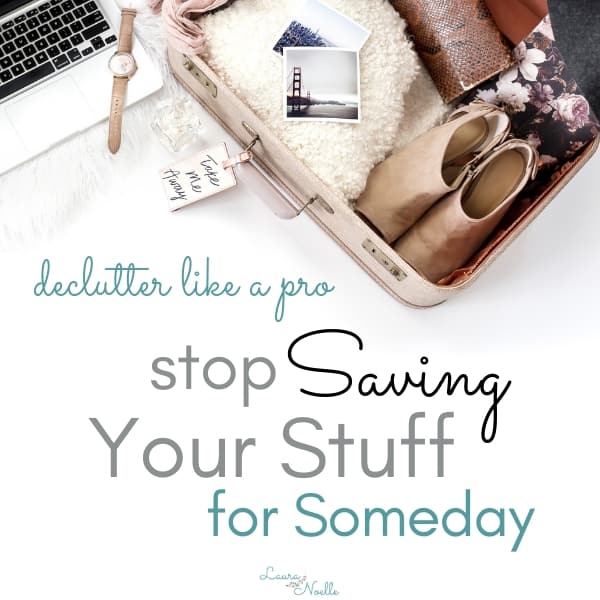
These emotional connections to our stuff are built unconsciously and they can really slow down or stall the decluttering process.
That box of old yearbooks. A bag of craft supplies. Hobby materials. Clothes that don’t quite fit–right now at least.
Those are all things we are inclined to hang onto because we just might use them someday.
But here’s the deal.
Someday is a trap.
And it will keep you from moving forward. Oftentimes, it actually makes you go backward in the process. Use these pro tips on decluttering your house to put the fear of “someday” behind you and blast through your decluttering goals!
How Someday Holds You Captive
When you get stuck decluttering, it’s usually because there is an emotional or mental block in your way. First off, please know that this is totally okay and completely normal.
Some people have very little attachment to material goods, but most of us have at least some stuff that we care a great deal about. It’s okay. Normal!
It’s healthy to have attachments to some things, but it’s very unhealthy to have an attachment to everything. Or to equate that attachment with a fear that if you lose that item, your quality of life will go down.
…did you catch that?
When you keep an item “because you might need it someday” you’re really telling yourself that at an undetermined time in the future, you might regret the decision to get rid of that item. Ultimately, what you’re really feeling is:
fear that you will suffer in the future if you don’t have that item.
Now, of course, what’s happening here is that we’re failing to remind ourselves that we would actually have to end up in a position where we would need that item in order to experience this suffering. In reality, the chances of that are typically quite slim.
It may happen, but it also may not. This uncertainty takes the fear of suffering and compounds it with insecurity and doubt about the future.
All in all, it becomes a debilitating and endless circle of panic. Not only does our decluttering progress stall out, but we become trapped in second-guessing ourselves and end up completely immobile.
The Mindset That’s Keeping You Stuck
Holding onto things that could have a use someday is often tied to a frugal mindset. While there’s nothing wrong with being frugal–I try to be frugally minded myself–there is a caution that comes with frugality.
A frugal mindset has the intention to make the most use of the things in our life. That’s a positive thing. The danger zone comes when a frugal person keeps everything because it might have a use…someday. This quickly passes into the spectrum of saving, collecting and ultimately, hoarding.
Generations past, including our grandparents and great-grandparents, learned the important skill of making the most of everything. This was a necessity during times like The Great Depression when resources were limited. My grandparents excelled at the “waste not, want not” mentality and it served them well. They hand made, refurbished, cooked, canned and crafted all their lives.
But it’s not the 1920’s anymore. It is not a necessity to live like that anymore.
If you’re homesteading, you have more reason to keep miscellaneous materials, but the majority of us in cities and towns simply have no use or function for excessive odds and ends.
Most people these days don’t mend ripped clothes or fix broken furniture. If you do, that’s awesome, but most of us don’t have the time or skill to do it, and yet, we keep items in disrepair in our possession because someday we think they’ll get fixed. Will they really?
Now, listen closely. Sustainability and conservation are huge and important issues we face. There is no excuse to be wasteful, but you also don’t need to keep everything just in case.
Going forward is more important than going back.
What does that mean? Simply put–decluttering the stuff you already have is not going to make you a wasteful person.
It is far more important that you make conscious choices to buy and consume LESS in the future.
Bring less into your home and you will have less to declutter in the future. Stop buying things you don’t need and you instantly become less wasteful and your environmental footprint will shrink.
If you’re not sure where to start, I’d encourage you to do some research into the industry of fast fashion and mass consumerism. The Minimalism Documentary is an excellent place to start.

Your Ideal Self Isn’t Really You
Beyond frugality, there is another very common mental block that holds us back from decluttering.
It’s your ideal self, and holding onto this elusive figment of your imagination is hurting you.
Now, here’s the deal. Keeping a positive growth mindset is important. Setting goals and actively taking steps to become a better person is awesome. Self-improvement and personal development are key to a productive and fulfilling life. Creating a life goals list and a vision board are incredibly powerful tools to change.
Growing as a person has nothing to do with your ideal self.
This is because your ideal self is made up.
Your ideal self is created as a combination of who you want to be, and also who you think you should be.
Becoming who you want to be is great, but becoming who you think you should be usually takes you to places of inauthenticity. You may think you should be all things to all people because someone put those expectations on you (parents, spouses, friends). Not realistic. You may feel you need to be a superhero, and that’s a lot of pressure to live up to.
An ideal self is usually filled with expectations, comparison, guilt, and regret.
Here’s my ideal self:
She’s an amazing wife who plans fancy date nights each week. She’s a top-notch mom who homeschools, does creative activities every day and always knows the right thing to say. Her house is spotless, real-food meals are cooked daily, and she never feels stressed or loses her temper. She scrapbooks, DIYs her own household products, perfectly balances work and family and adds a homemade touch to everything.
Okay, I am some of those things but I am not all of them. It’s just not possible for anyone to be all that.
So what does this have to do with decluttering help? If you walked into my storage closet, you’d see boxes of craft and scrapbook supplies. It’s been 5 years since I touched a scrapbook. Due to life circumstances, changing interests and an understanding of my skill set, scrapbooking has officially become a part of my ideal self.
As a result, I have boxes of materials that I don’t use or need. These items need to go because they are holding me back. I need to let go of the person I wish I was and enjoy the person I am today.
What’s hiding in your storage closet, attic, basement or garage?
What forgotten hobbies and materials are cluttering up your home? Maybe you have a professional wardrobe, but no longer work outside the home. Perhaps you used to compete in a sport, but those days are far behind you. Or maybe you spent a few too many hours at the bookstore and collected a library the size of Beauty and the Beast’s, yet you only have time to read one book a month.
Be brutally honest with yourself. Spend some time reflecting on who you are, and who are working to become. Be honest about what parts of your ideal self are truly illusions that are unlikely to have a place in your future.
Leaving Fear in the Dust
How do you crush the fear and uncertainty of someday? You fight back with practicality. When you see something and think “I wonder if I should keep that because I might need it someday…” Stop yourself.
Then ask yourself two very important follow-up questions:
-
How likely are you to actually use this item in the future?
-
Is the item replaceable?
Let’s break it down.
First, are you likely to use this item? Think about the last time you used it. When and why did you use it? Now for a little critical thinking… when you used that item, was it necessary or did you just use it because you had it?
Is this item essential to your life? Basically, if there is another item that could equally do the job of that item, do you need to keep multiple things when just one will do? This may apply more to utensils, personal care products, and tools and hobby/crafting materials.
I’m not talking about the cheese grater you use every day. Or your hairbrush or toothbrush. We’re talking about those things that we keep around because maybe they will be useful one day.
Piles of books or courses you bought years ago. Scrapbooking tools. Cupcake decorating supplies. Athletic or sports equipment. Gardening materials. Empty containers. Drawers of office supplies. Clothes that don’t fit.
Those are the types of things we tend to hoard even if we don’t use them, and sometimes we need a little help to declutter them.
To help with this, ask yourself a second question. Is this item replaceable? Is it a book you can find at the public library or on Amazon? It is a tool or product that you could easily borrow from a friend or family member? What’s the monetary value if you needed to replace it?
Small items that could easily be purchased again if absolutely needed in the future should be carefully considered for the decluttering pile. For more encouragement on ruthlessly evaluating your stuff, here’s how to purge clutter without guilt.
Decluttering Tips for Sentimental Items
If an item is of high value or irreplaceable, think about how the item is serving you. Is it sentimental or a family heirloom? Does it add value or beauty to your life?
Some things are worth keeping, but not all things. Keepsakes should be select items that have meaning and value to you. They should be the best of the best. For instance, you don’t need to keep every single trophy from childhood sport and activities. Pick one or a few that are your most treasured and let go of the ones with less meaning.
For sentimental family heirlooms, consider if there is another person in your life (family or not) who could appreciate that item more than you. Perhaps it’s a historical item that a museum or historical society would value?
When you’re decluttering your home with a heart-centered focus, the process isn’t just about if you use an item or not–rather, you are evaluating purpose and meaning for the items you choose to keep in your life.
Sometimes, letting go of an item means setting yourself free while you bless someone else. Possessions that burden you could actually grace someone else’s life. Because we’re focusing on your heart, this process means truly thinking about what’s best for you and why you’re holding onto items.
If you’re struggling with guilt about letting things go, you can dig into how to let go of remorse and guilt here.
If something you own is holding you back and it could help someone else, let it go.
Guidelines for Examining Your Stuff Intentionally
So you’re ready to start decluttering your “someday” stuff. Let’s get to it!
Ask yourself:
- When was the last time I used this item?
- When will I use it again?
- Is this item replaceable?
- What is this item’s value?
- Is this an item I want to take into my future, or could it better serve someone else?
These are tough questions. While making quick decisions is key to reducing overthinking, sometimes it warrants spending some time to really think through what value an item holds and whether it has a place in your life or not. Sentimental items especially require a great deal of heart-work to sort through why you are attached to that item and how you can best honor that value.
As you make decluttering decisions about someday items, acknowledge the emotions, but stay focused on moving toward action. Regardless of what the item is, you have four choices:
- If you love it, use it.
- If you’re planning to learn to use something, put it on your calendar and do it.
- If you truly do plan to use something of value in the coming years, pack it carefully away and label the box clearly. Keep it out of the way, but also in an easily seen place in storage.
- If you know that something is not a part of your life anymore, let it go.
A Word About Decluttering Regret
So you’re ready to think practically and ask specific questions about the use and value of the stuff you’re keeping for someday. You don’t need to be fearful of letting an item go from your life when you know you won’t likely need it, or that it can be easily replaced or borrowed if you did need it.
But what about regret? What if you donate that box of empty CD cases and then, three years later, you want to mail a CD and think “oh no! I should have kept those cases–I need one now!” (Yes, this actually happened to me. No, it wasn’t the end of the world.)
First off, this rarely happens. Yes, it does happen–but usually with only one or two items out of the hundreds, perhaps thousands, that you choose to declutter while minimizing your home. There have been only a small handful of items I ever regretted parting with, and even with those, I want to be very clear–the regret was temporary and I moved on.
This means that if you ever wish you hadn’t gotten rid of something, most cases are quickly resolved by 1) creative thinking, 2) replacing the item, or 3) choosing to forget and move on. I’ve typically been able to think of a different solution to my problem or find a substitute or replacement. On occasion, I’ve just had to move on with life.
Remember that this is about the overall picture. The goal is to declutter the things that are holding us back from intentional life. We’re weighing out the burden and benefits of owning possessions. A garage full of stuff you won’t ever use is just as burdensome as a closet full of clothes that don’t fit.
A house packed with clutter (and clutter is defined as stuff you don’t use or need) will keep you bound and chained to a life of caring for, investing in and maintaining material possessions. That, my friend, is not freedom.
Don’t let the fear of regret keep you from simplifying your life.
Final Tips for Decluttering Your Home of “Someday” Items
Keeping stuff in case you need it someday ultimately keeps you stuck as you work toward your decluttering goals. Most of the time, the fear that holds you back is blown out of proportion and never actually happens.
My best tip for decluttering your home? Simple step-by-step actions that slowly, but consistently, move you along on your journey to a minimal, simple home. You can leave fear in the dust and pursue vibrant, meaningful life by letting go of the picture of an ideal self and embracing your true self.
Keep focused on how your heart is leading you on this path and how your possessions are either adding to your life or taking from it.
Someday won’t get you anywhere. Instead, commit to today. Reflect, evaluate and take action! You’ve got this!
Related Articles on Decluttering
- How to Ruthlessly Purge Your Stuff
- Clearing Your Clutter with Quick Wins
- Pro Tips on Ditching Buyer’s Remorse & Decluttering Guilt
WANT TO SAVE Tips on Decluttering Your Home: Keeping Stuff for Someday is a Trap FOR LATER? PIN TO YOUR FAVORITE PINTEREST BOARD HERE:
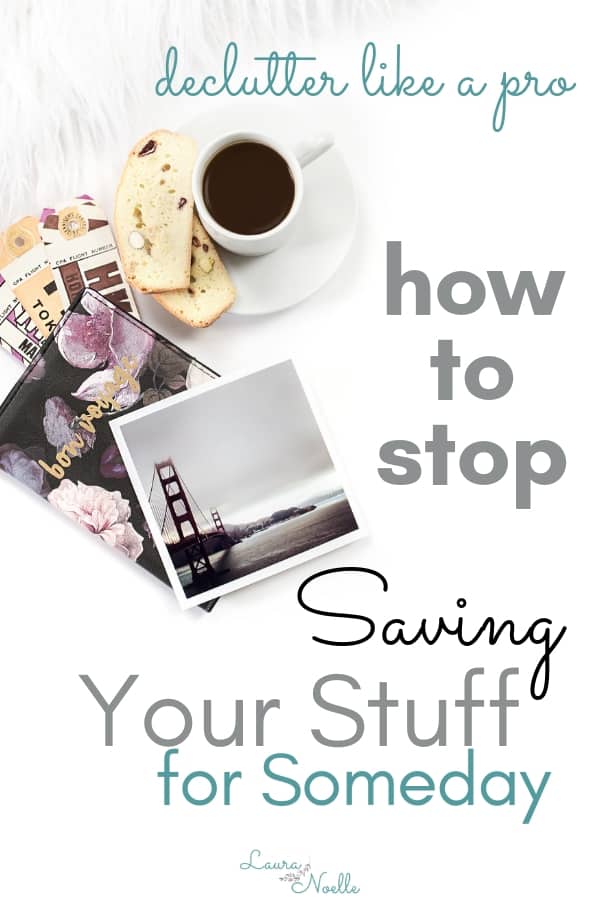

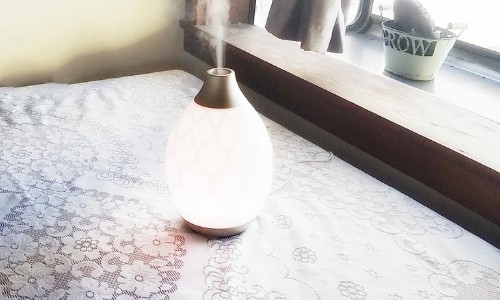
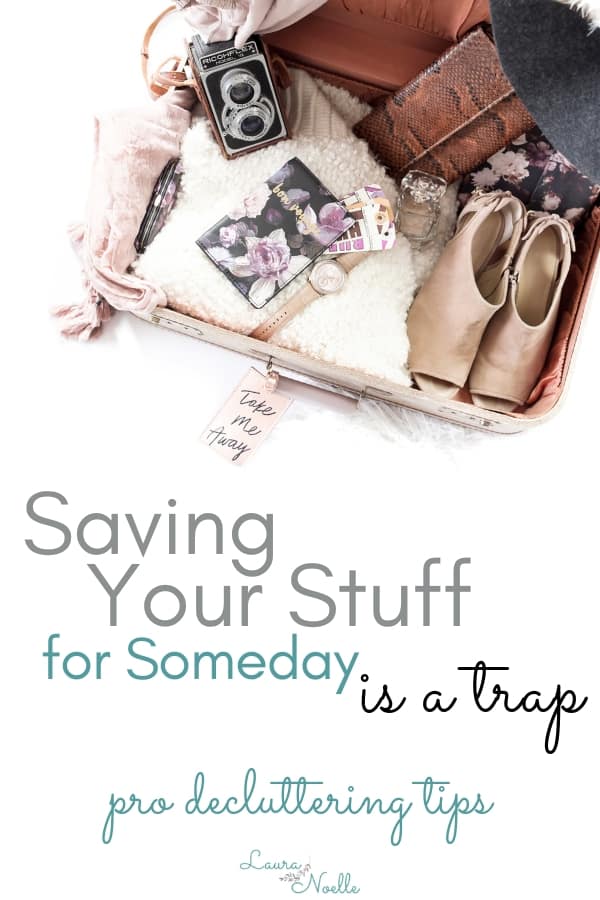
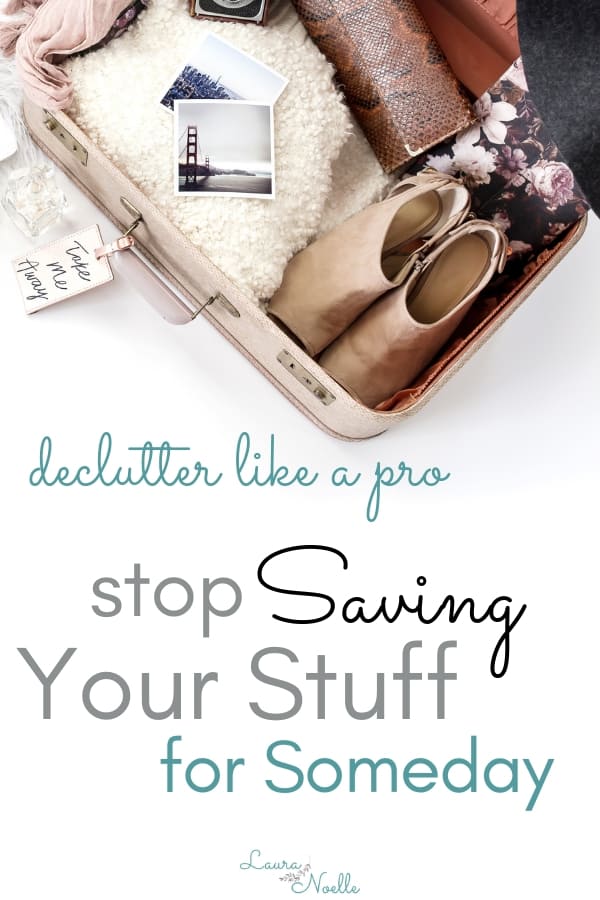
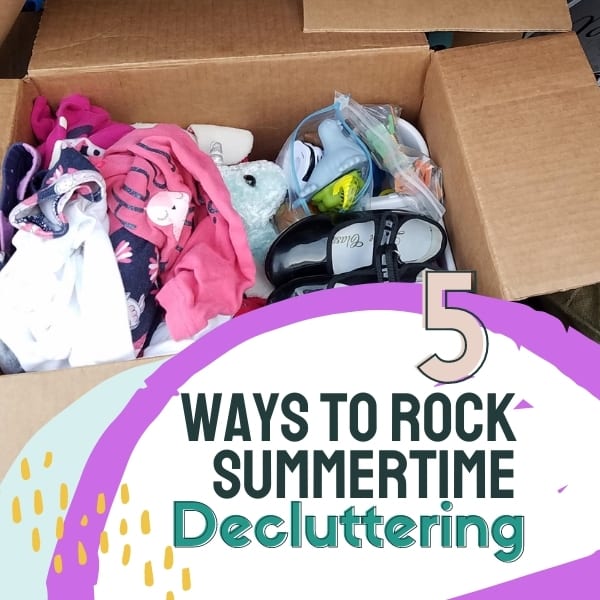
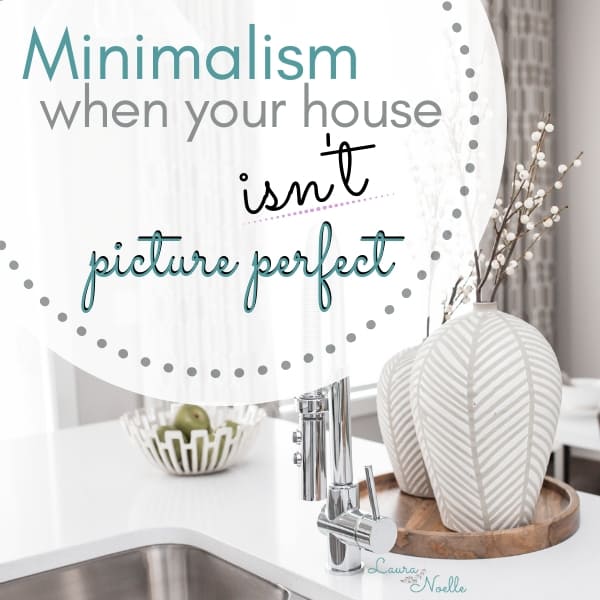

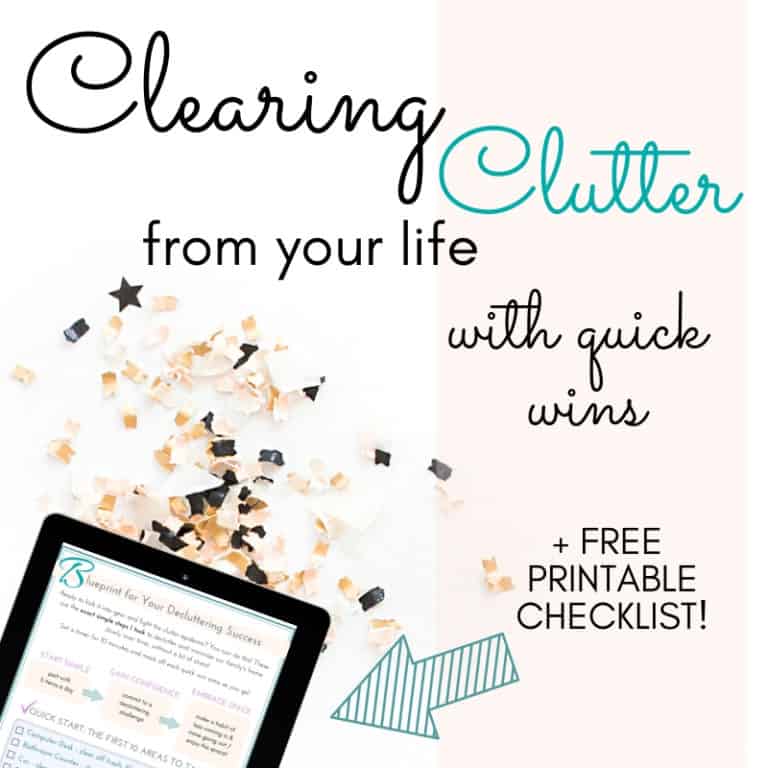
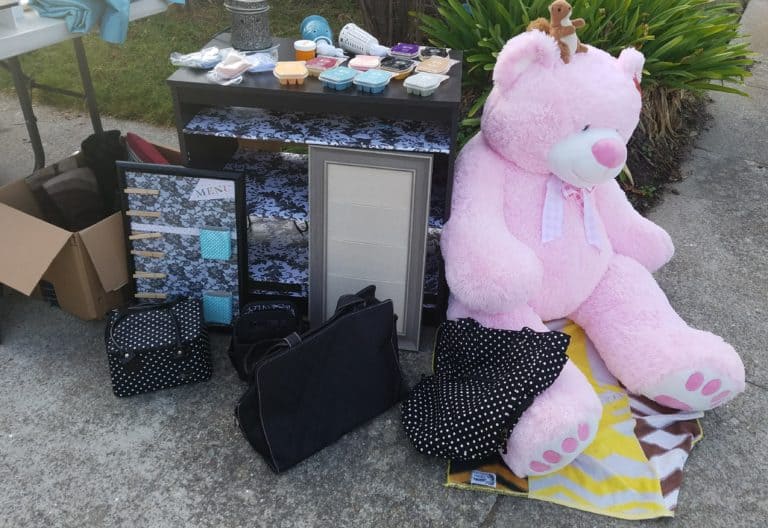
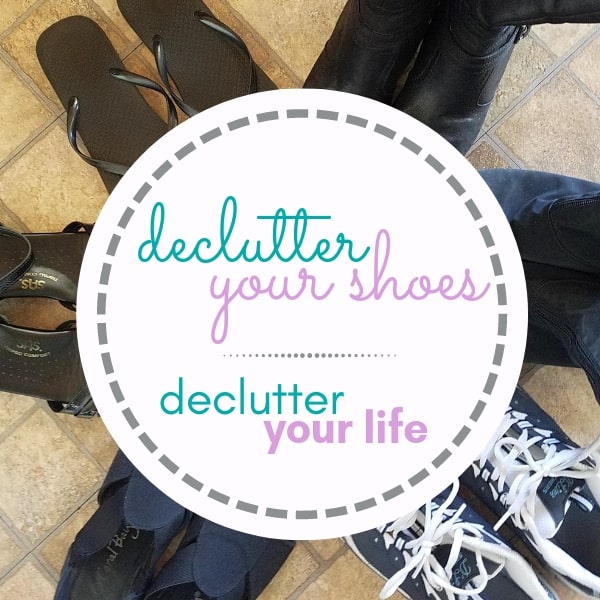
These tips are great, Laura! I love what you said about how “we need to let go of the person we wish we were and enjoy the person we are today.” I completely agree that if or when decluttering regret arises it’s usually temporary and there’s a way around it. If we are fortunate enough to have more than we truly need then a little improvisation might be good for us!
Thank you, Andrea! Yes, I totally agree. We can all be a little more creative and flexible sometimes. While having more things has made us more self-sufficient, it certainly hasn’t made life simpler!
This is such a helpful post! I know we have been doing this -a little in our own home, but definitely in both of our parents’ homes! The questions you gave us to ask will be referred back to again and again! Thanks so much!
Karrilee, thank you so much! I’m so glad you found the questions helpful!
Love this truth and absolutely enjoy your blog! “A frugal mindset has the intention to make the most use of the things in our life. That’s a positive thing. The danger zone comes when a frugal person keeps everything because it might have a use…someday. This quickly passes into the spectrum of saving, collecting and ultimately, hoarding.” I”m so glad you shared on Fresh Market Friday Linkup!
Thank you, Crystal!
I have been clearing out all of the things I kept for someday for a year. I kept way too many things that I thought my kids would want some day. For the most part everything is neatly organized by child but guess what…they don’t want it. They really don’t want any of it.
It is actually a great feeling to get it out of my house. I’ve kept just a few things that mean the most. I think this is an awesome post with great tips. Letting go of your ideal self and embracing your true self is so true! Thanks so much!
Tammy that’s so awesome! I struggle with keeping my daughter’s things too–mostly because my parents kept almost everything from my childhood and now I have all that stuff plus my daughter’s things. It gets super overwhelming! I think what you’ve done is so important–taking time to go through it and keep the most meaningful, and letting go of the rest. It’s definitely a process for each one of us!
I fell in this trap many times before, especially since becoming a mom. You know, clothes that will never fit you ever again, baby related stuff that you can’t find the heart to give away. Your tips are really useful for preventing this bad habit. I think as,with all things, it just takes a bit of practice and determination. Thank you!
Yes, absolutely! Letting go of the baby things and childhood things is the hardest for me as well. But with practice and time, it does get easier!
These tips are great. I am in between my decluttering days and this is going to help a tonne.
I like the idea of giving sentimental items to a family member. It really makes sense. You get it out the house and you still get to keep it. I never thought of it.
For a lot of items, I decided to take pictures of it. I can keep it digitally on my laptop and cherish it whenever I want. This is mostly for memories, photographs, first letters etc.
Over the years I’ve come to truly appreciate our ability to digitize and file things–not only does it make it accessible for us anywhere we are, but also makes it far easier to sort, search and find something when we want it! I’ve gotten into the habit of always asking my family if they want something from my childhood, etc, and then if they say no–I can donate it without regret, knowing it isn’t something any of us value enough to keep!
“Going forward is more important than going back.” I absolutely love your perspective on decluttering. My husband likes to hang on to things, and I’m just the opposite. However, I think even the most sentimental person after reading your article would see the value in creating a more simple life with less “things.” This was such an enlightening read!
Thank you, Cathy! I’ve spent a lot of time regretting the past, and in the end, found it really only made me more miserable! Always a goal to help others move forward too–even those that like their stuff =)
Wow, Laura! You are so speaking my language. Love all the tips you outlined here and the push to keep decluttering. Decluttering guilt is so real and it
keeps so many of us hostage to just getting
It done. If years down the road I need something, I hope to be in a better position to simply go out and get it instead of worrying about the fact that I gave it away years before. Love everything about this article really ????
Aw thank you, Stacy! I’ve said the same to myself many times. If I reallllly need something in years to come, I’m sure I’ll figure out a way to get it! =)
Wow, this post was so insightful. I recently went through my things and got rid of some of it, but I know that I need to go through it all again (I feel like that’s the best way for me to let go of my clutter addiction lol bit by bit, I get rid of more and more) and I will keep these points in mind when I do!
Melissa–that’s been the key for me as well. I go through things bit by bit, over and over (especially when it comes to sentimental and kids stuff). Each time I let go of a little more, and in the end, it makes a huge difference! Keep it up!
I have 3 schooling children. Many times, those that I have kept were the stuff that saved them for costumes amd props . That its a relief we dont have to go out to buy or borrow.
MY dilema is that its taking our time cleaning and organizing them, and the space of the hose is already being taken up.
I totally understand your dilemma! Especially with kids, there will always be a need to keep some items in “holding”, but it’s also important to not keep everything “just in case”. Oftentimes, those little items kids need could be borrowed from a friend, found via a Buy Nothing group, or figured out by being creative. Having a box of “creative materials” is totally acceptable, but keeping rooms full of costumes and things that aren’t regularly used ends up burdening you more than it’s worth.
Umm…When you were decluttering, maybe you should have held onto a history book. The Great Depression was in the 1930s, not the 1920s. Consumerism was actually pretty high in the 1920s.